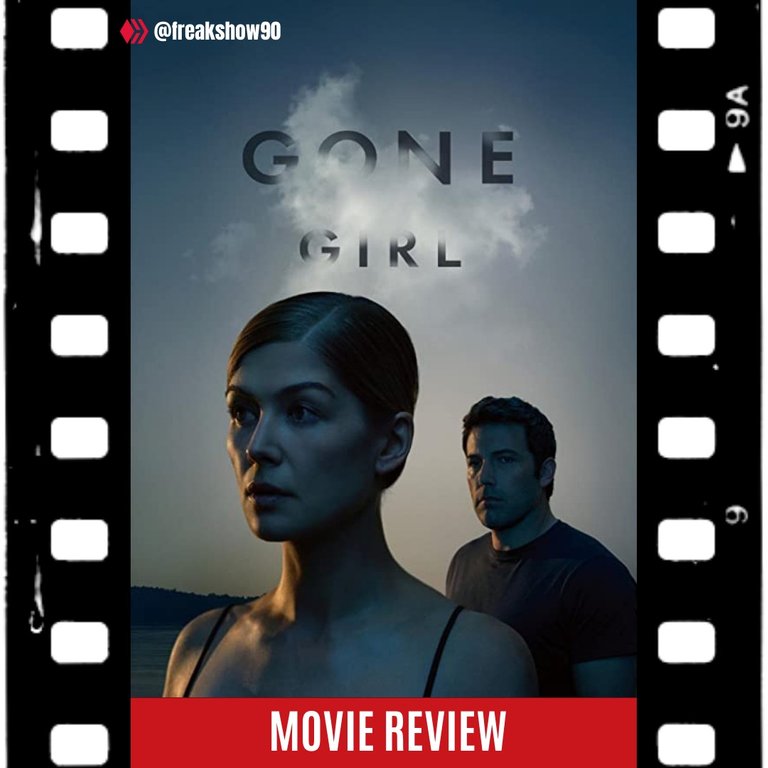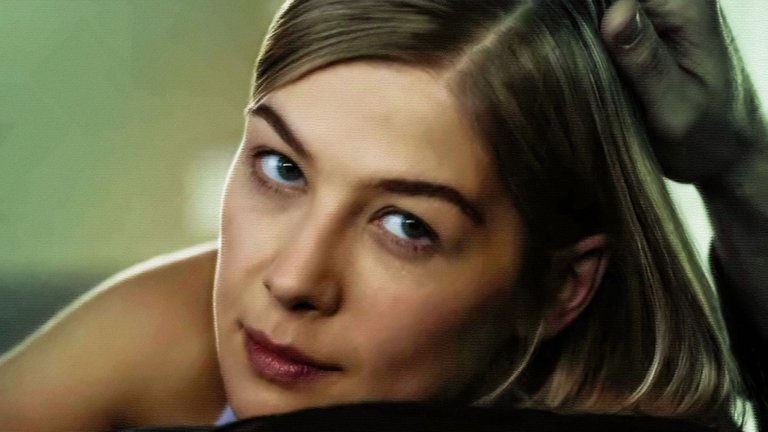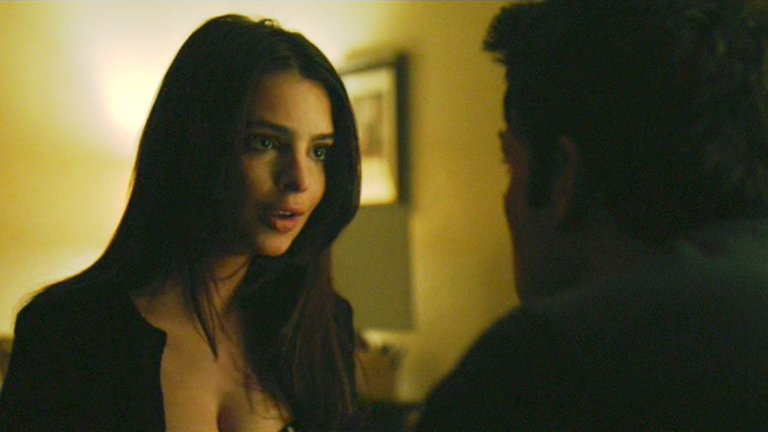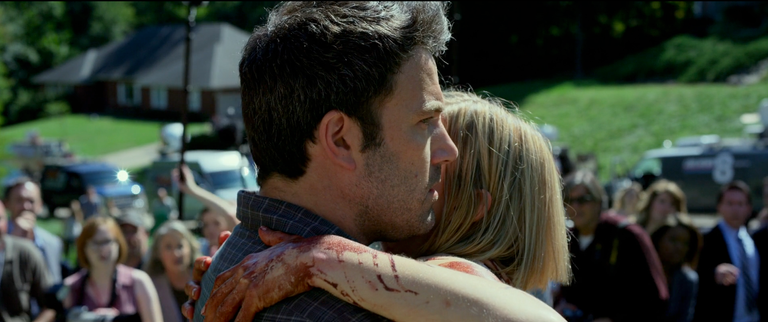This is why "Gone Girl" is so catchy. Movie REVIEW [ENG/ESP]
(Edited)

Let me put it this way. "Gone Girl" is to the thriller genre, much like "E.T." is to the sci-fi genre. And I'm not exaggerating. It is simply too captivating a film. The way the tension is developed from the very beginning of the fade-out grabs the audience immediately. Moreover, within the making of this masterpiece there are certain characteristics that I wish to explain very well, and that in my opinion are what make it stay in our retinas forever. And, also that it has become a contemporary "classic". A first hand sample of how psychopathy works.
Now, let's start with the first notable issues within this "film". It is written (both in its adapted screenplay, for the film itself) and in the original version (the novel) by a woman. In this case, it is the same woman: Gillian Flynn. And this aspect is not merely anecdotal. On the contrary, it is essential to bring perspective to this production. Because in thrillers, there are plenty of stories of men who end up developing a psychopathy/compulse/obsession, and we have all seen them.
Déjenme ponerlo así. "Gone Girl", es para el género de películas de suspense/thriller, algo bastante parecido a lo que es "E.T" para el de "sci-fi". Y no exagero. Sencillamente, es una película demasiado cautivadora. La manera en cómo la tensión es desarrollada desde el inicio del "fade out· atrapa a la audiencia, de inmediato. Además, dentro de la realización de esta obra maestra hay ciertas características que deseo explicar muy bien, y que a mí modo de ver es lo que hace que quede guardada en nuestras retinas por siempre. Y, también que se haya vuelto un "clásico" contemporáneo. Una muestra de primera mano de cómo actúa la psicopatía.
Ahora bien, empecemos con las primeras cuestiones destacables dentro de este "film". Está escrita (tanto en su guión adaptado, para la película propiamente) como en la versión original (la novela) por una mujer. Que en este caso, se trata de la misma: Gillian Flynn. Y este aspecto, no es meramente anecdótico. Al contrario, es esencial para aportar perspectiva a esta realización. Porque en el cine de suspense, abundan las historia de hombres que terminan desarrollando una psicopatía/compulso/obsesión, y ya todos los hemos visto.

However, this phenomenon has rarely been developed with quality and, above all, with sensational mastery on the "big screen". In this sense, the feminine touch within the script and the plot is marked. So much so, that the very plot that gives the film its meaning is based on a meticulous but extremely well-planned (Machiavellian and terrifying) plan by the protagonist, in order, among other things, to get her husband's attention back on track for her, and thus (following the sick vision of the protagonist, which is also in the narrator) "reignite the spark", which she feels has been extinguished.
The planning of deception, the compulsiveness of the manic acts, the meticulousness of the details to provoke a visceral reaction against the other protagonist, in this case, "Amy's" husband, "Nick", produces in the viewers a sense of disgust but at the same time intrigue. For it is by no means a total rejection of what she does but a somewhat sadistic taste to know more about the plot and how the whole psychopathic but well-orchestrated plan ends.
Sin embargo, este fenómeno, pocas veces se ha desarrollado con calidad y sobre todo, con una maestría sensacional en la "gran pantalla". En este sentido, el toque femenino dentro del guión y de la trama es marcado. Tanto, que la mera argumentación que da sentido a la película está basado en un meticuloso pero extremadamente bien planificado plan (maquiavélico y terrorífico) por parte de la protagonista, para entre otras cosas, volver a "encarrilar" la atención de su esposo hacia ella, y así (sigue la visión enfermiza de la protagonista, que también en la narradora) volver a "encender la chispa", que ésta siente que se ha apagado.
La planificación de engaño, la compulsividad de los actos maniáticos, la meticulosidad de los detalles para provocar una reacción visceral contra el otro protagonista, en este caso, el esposo de "Amy", "Nick", produce a los espectadores una sensación de asco pero al mismo tiempo intriga. Porque no es, de ninguna manera un rechazo total a lo que ella hace sino un gusto algo sádico por saber más de la trama y en cómo acaba todo ese psicopático pero bien orquestado plan.

And these psychological traits that I describe in previous paragraphs are the same ones that the Hollywood film industry, but also the whole world, has been exploiting since the unquestionable success of Alfred Hitchcock's "Psycho". The master knew quite well how to "do his homework" and prior to the making of that film, he was informed by the police about a notorious killer from a rural American town, named Ed Gein, whose detailed but twisted story I will tell in another time in a sequel of horror posts I will be publishing.
For me, "The Amazing Amy", pseudonym of the protagonist of "Gone Girl", the core of the character is, or I think should be, in the great poisoners of American crime history. While she doesn't use that method, the character's mentality bears too many resemblances to the homicidal, cold/calculating type that characterises the so-called "black widows" of the Red Chronicle. Moreover, if you have seen the film, you will agree with me that "Amy's" method is manipulation. Systematic, cold, calculating, coarse, determined.
Characteristics of a person with multiple personality disorders, but in this case, she seems to have all the "winning chips" of psychopathy. While her male partner is no "charitable soul" or a complete "hero", neither is he the twisted, sick monster that she feels "needs to be corrected and brought back on track to bring out the best version of him". On the contrary, he is a normal guy, a writer who has fallen a bit into oblivion and certainly distracted who is in a mid-life crisis and who has not loved his wife for some time but does not know how to inform her.
Y éstos rasgos psicológicos que describo en párrafos anteriores, son los mismos que ha venido explotando la industria del cine de Hollywood pero también del mundo entero, desde el éxito incuestionable de "Psicosis" de Alfred Hitchcock. El maestro supo bastante "hacer su tarea" y previo a la realización de ése filme, se informó policialmente sobre un conocido asesino de un pueblo rural estadounidense, de nombre Ed Gein, y que en otro momento contaré su detallada pero retorcida historia en una secuela de posts de terror que estaré publicando.
Para mí, "The Amazing Amy", pseudónimo de la protagonista de "Gone Girl", el núcleo del personaje está, o creo que debería de estarlo, en las grandes envenenadoras de la historia del crimen estadounidense. Si bien, ella no usa ese método, no menos cierto es que el tipo de mentalidad que tiene el personaje guarda demasiados parecidos con el tipo homicida, frío/calculador que caracteriza a las conocidas como "viudas negras" de la crónica roja. Además, si han visto la cinta, podrán estar de acuerdo conmigo en que el método de "Amy" es la manipulación. Sistemática, fría, calculadora, soez, decidida.
Características de una persona con múltiples trastornos de la personalidad, pero que en este caso, parece tener todas las "fichas ganadores" de la psicopatía. Si bien, su pareja masculina no es ninguna "alma caritativa" o un completo "héroe", de igual modo tampoco es el monstruo retorcido y enfermo que ella siente que "debe ser corregido y encarrilado para sacar su mejor versión". Al contrario, es un tipo normal, un escritor que ha caído un poco en el olvido y ciertamente distraído que se encuentra en una mediana crisis de edad y que desde hace tiempo no ama a su esposa pero que no sabe cómo informarle.

Genuinely, I find this work by David Fincher, a film too gripping, too fascinating. In fact, on Netflix, I tend to rewatch it every now and then. I always find new and interesting details. But I firmly believe that what attracted you so powerfully to me is the reason for the evil that I notice in this work. One side simply wants to dominate, destroy, minimise and subjugate the other, for the simple fact that for that person, that view has legitimacy and is right. While the other, knowing his fate, tries (frustratingly) to make others see the monster he has to deal with.
There are bitter endings, we have all witnessed them at one time or another in the history of cinema. But it must be horrible to show that you live with and are married to a deranged, unscrupulous madwoman, and that even the detective, who not so long ago suspected you, believes you but legally can do nothing; because no law or statute has been broken. That level of isolation and loneliness must be something I wouldn't wish on my worst enemy. Finally, "Amy", also knowing what's coming, rhetorically asks "What are we going to do to each other?", fade in, and on credit. End of the film. What a bitter taste...
Genuinamente, hallo esta obra de David Fincher, una película demasiado atrapante, fascinante. De hecho, en Netflix, suelo volver a verla cada cuanto. Siempre le encuentro nuevos e interesantes detalles. Pero creo, firmemente, que lo que a mí te ha atraído tan poderosamente es el por qué de la maldad que yo noto en esta obra. Una parte sencillamente quiere dominar, destruir, minimizar y someter a la otra, por el simple hecho de que para ésa persona, esa visión tiene legitimidad y está bien. Mientras que el otro, sabedor de su destino, intenta (frustradamente) que los demás vean el monstruo con el que él tiene que lidiar.
Hay finales amargos, todo lo hemos presenciado alguna vez en la historia del cine. Pero debe ser horrible demostrar que vives y estás casado con una loca desquiciada y sin escrúpulos, y que hasta la detective, que hace no mucho sospechaba de ti, te crea pero legalmente no pueda hacer nada; porque no se ha roto ninguna ley o estatuto. Ese nivel de aislamiento y soledad, debe ser una cosa que no desearía ni a mi peor enemigo. Finalmente, "Amy", también conocedora de lo que viene, retóricamente pregunta "¿Qué nos haremos el uno al otro?", fade in, y a crédito. Fin de la película. Qué sabor amargo...

0
0
0.000
0 comments